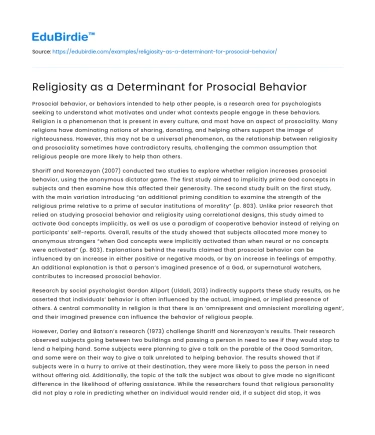Prosocial behavior, or behaviors intended to help other people, is a research area for psychologists seeking to understand what motivates and under what contexts people engage in these behaviors. Religion is a phenomenon that is present in every culture, and most have an aspect of prosociality. Many religions have dominating notions of sharing, donating, and helping others support the image of righteousness. However, this may not be a universal phenomenon, as the relationship between religiosity and prosociality sometimes have contradictory results, challenging the common assumption that religious people are more likely to help than others.
Shariff and Norenzayan (2007) conducted two studies to explore whether religion increases prosocial behavior, using the anonymous dictator game. The first study aimed to implicitly prime God concepts in subjects and then examine how this affected their generosity. The second study built on the first study, with the main variation introducing “an additional priming condition to examine the strength of the religious prime relative to a prime of secular institutions of morality” (p. 803). Unlike prior research that relied on studying prosocial behavior and religiosity using correlational designs, this study aimed to activate God concepts implicitly, as well as use a paradigm of cooperative behavior instead of relying on participants’ self-reports. Overall, results of the study showed that subjects allocated more money to anonymous strangers “when God concepts were implicitly activated than when neural or no concepts were activated” (p. 803). Explanations behind the results claimed that prosocial behavior can be influenced by an increase in either positive or negative moods, or by an increase in feelings of empathy. An additional explanation is that a person’s imagined presence of a God, or supernatural watchers, contributes to increased prosocial behavior.
Save your time!
We can take care of your essay
- Proper editing and formatting
- Free revision, title page, and bibliography
- Flexible prices and money-back guarantee
Research by social psychologist Gordon Allport (Uldall, 2013) indirectly supports these study results, as he asserted that individuals’ behavior is often influenced by the actual, imagined, or implied presence of others. A central commonality in religion is that there is an ‘omnipresent and omniscient moralizing agent’, and their imagined presence can influence the behavior of religious people.
However, Darley and Batson’s research (1973) challenge Shariff and Norenzayan’s results. Their research observed subjects going between two buildings and passing a person in need to see if they would stop to lend a helping hand. Some subjects were planning to give a talk on the parable of the Good Samaritan, and some were on their way to give a talk unrelated to helping behavior. The results showed that if subjects were in a hurry to arrive at their destination, they were more likely to pass the person in need without offering aid. Additionally, the topic of the talk the subject was about to give made no significant difference in the likelihood of offering assistance. While the researchers found that religious personality did not play a role in predicting whether an individual would render aid, if a subject did stop, it was a helping response related to religiosity. The study concluded that variables that are most likely to predict helping behavior is the content of one’s thinking and the amount of hurry they are in. The most unexpected and ironic result was that subjects about to give a talk on the parable of the Good Samaritan would not stop to help a person in need if they had time constraints. That is, thinking about the Good Samaritan actually decreased helping behavior.
Both of these studies are just two of a myriad of research conducted on the relationship between prosocial behavior and religiosity. The contradiction between the results illustrates that while individuals described as religious are more likely to help than others, it is not a universal trait.






 Stuck on your essay?
Stuck on your essay?

